In the construction industry, where projects are complex, timelines are tight, and multiple stakeholders are involved, selecting the right CRM tools to streamline operations is essential.
Customer Relationship Management (CRM) software can significantly boost the productivity of sales and field teams by simplifying their daily task management. But with so many options available, which are the best construction CRMs?
In this CRM comparison blog, we’ll look at the ten best CRMs for construction companies, contractors, and builders. We’ll evaluate them based on their features, pros and cons, user reviews, and prices—helping you find the ideal construction CRM solution that matches your needs.
Why Choosing the Best CRM for Construction Companies Matter
Construction CRM software helps businesses to be more efficient and make data-driven decisions. Your CRM platform is a data collection repository, helping you to store, analyze, and understand your customer data. The more customer data you collect, the greater your insights will be, and the faster your construction company can grow. Customer data is a game-changer.
Research from the McKinsey Global Institute shows that data-driven organizations are:
- 23x more likely to win new customers
- 6x as likely to retain customers
- 19x more likely to be profitable
- 50% have sales well above their competitors
- 6x more likely to achieve positive returns than competitors
Home starts are declining, and construction companies are struggling to survive; these advantages are essential for home builders, contractors and construction companies if they want to survive.
TL;DR of the Best CRM for Construction Businesses
Each CRM offers a unique set of features designed to address specific challenges in construction sales. To help you find the right fit, we’ve compiled a list of the top 10 CRMs for construction companies, contractors, and builders, highlighting their key strengths.
- Pipeline CRM – Best construction CRM software for sales-focused team
- Procore – Best CRM for large construction teams
- Buildertrend – Best CRM for construction specialists
- Leap – Best CRM for solo contractors
- JobNimbus – Best CRM for roofing and gutter contractors
- Buildern – Best construction CRM with project management feature
- Followup CRM – Best construction CRM with bid calendar feature
- Dataforma – Best construction CRM with a client portal
- Odoo – Best construction management tool for marketing-focused contractors
- Workyard – Best construction management software with GPS tracking
1. Pipeline CRM: Best CRM for Sales-Focused Construction Companies
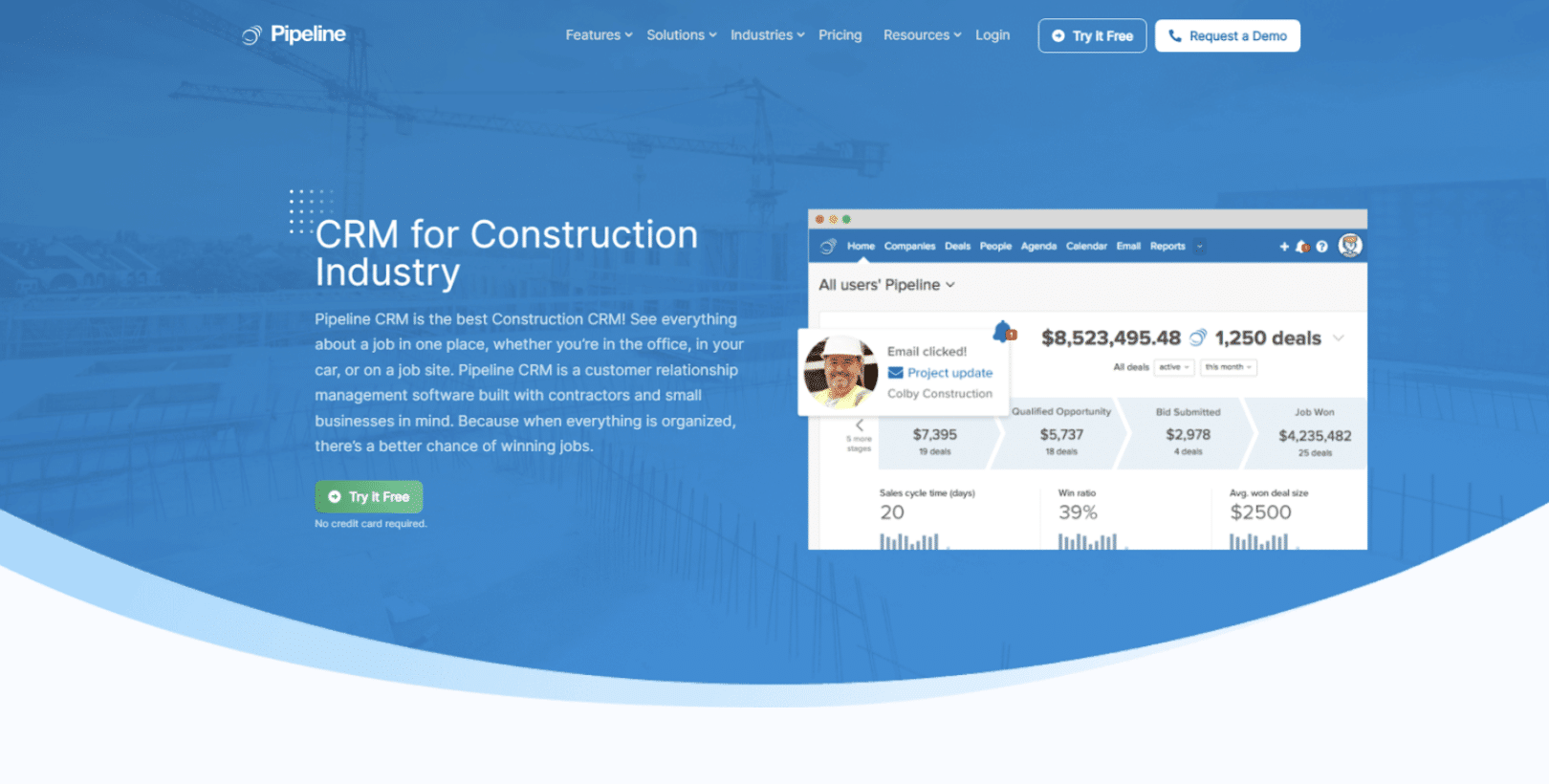
Pipeline CRM is made by salespeople for salespeople—and that includes construction sales.
Construction companies are often under a significant amount of pressure. They’re expected to generate sales in a stagnant market. If they want to survive, they need a steady supply of cash flow.
Pipeline CRM is easy to use and optimized around one thing. Closing sales.
This tool keeps every member of your staff on the same page with centralized communication — track conversation histories, deal progress, and communications. If your organization needs to manage your bids, projects, client details, and client follow-up in a centralized dashboard, then Pipeline CRM is a great fit. That’s why Pipeline CRM is the best construction CRM software for a sales-focused team.
Features
Pipeline CRM has all of the standard CRM features plus…
- Custom deal stages to suit the unique steps in your construction business
- Track and manage your email campaigns automatically via your account
- Pipeline integrates with the tools you’re already using
- Automations to automate next steps, activities, reminders, updates, etc.
- Smart agendas that build themselves as your team works, so everyone knows what needs to be done for each project
- SuperShare to send data to trusted contacts quickly and securely
- Open-source APIs to integrate with anything and everything you’re already using
- Native integration with tools like Zapier to customize integrations without developer or IT assistance
Pros and Cons
- Pipeline CRM is scalable yet very affordable
- Extensive sales management automations
- Integrates with a large list of software (e.g., Microsoft, QuickBooks, Google Apps, Zapier, Paycove, CallRail, etc.)
- Best-in-class customer support
- No on-premise options
- Best for small-to-medium organizations
Reviews
- 4.4/5 star rating on G2 (904 reviews total)
- 4.4/5 star rating on Capterra (616 reviews total)
- 9.8/10 score via TrustRadius
- 4.2/5 star rating via Gartner (41 reviews total)
Pricing
- Start plan: $29 per user per month
- Develop plan: $39 per user per month
- Grow plan: $59 per user per month
Learn more about Pipeline CRM’s pricing plan and features.
Watch this demo video to learn more about Pipeline’s Construction CRM.
2. Procore: Best Construction CRM for Large Sales Teams with Big Budgets
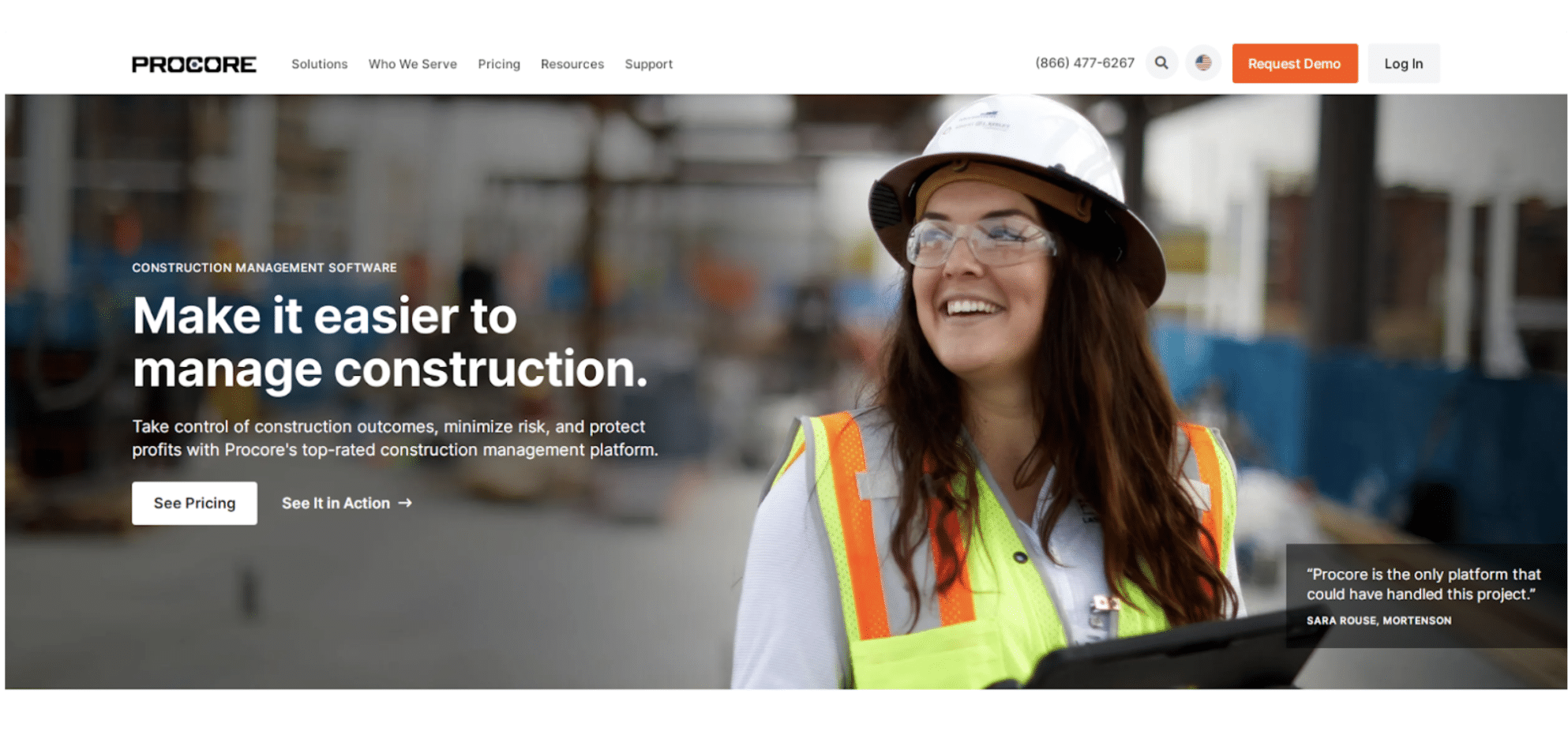
Procore is an end-to-end construction management tool that also includes CRM software.
Their CRM software handles bid, invoice, and capital project management. It also handles financials, quality assurance, safety, and compliance. While Procore claims it’s designed to scale with its users, its sweet spot seems to be focused on managing large, complex construction projects.
Procore “connects everyone and everything on one platform.”
This means all of your architects, engineers, owners, general contractors, specialty contractors, and materials suppliers can all be managed on their platform. Their platform is comprehensive, but it seems to be oriented around managing projects you already have rather than winning new projects.
Features
- Comprehensive A-to-Z construction management
- Unlimited users
- Unlimited 24/7 support
- Unlimited data
- Free training
- Procore construction network
Pros and Cons
- End-to-end generalist software
- The dominant construction software provider in North America
- Pricing ranges from $4,500 annually to $10,000+ annually
- Procore takes 2% – 5% of construction volume as a fee
“We charge an upfront annual fee by product and based upon your Annual Construction Volume (ACV) – the aggregate dollar value of the construction work across your projects.”
Reviews
- 4.5/5 star rating on G2 (1,722 reviews total)
- 4.5/5 star rating on Capterra (2,599 reviews total)
- 8.8/10 score via TrustRadius (1,196 reviews total)
- 4.5/5 star rating via Software Advice (2,581 reviews total)
Pricing
- Requires a quote
- Subscription ranges from between 2% and 5% of construction volume + tools used
3. Buildertrend: Best CRM for Construction Pros and Specialists
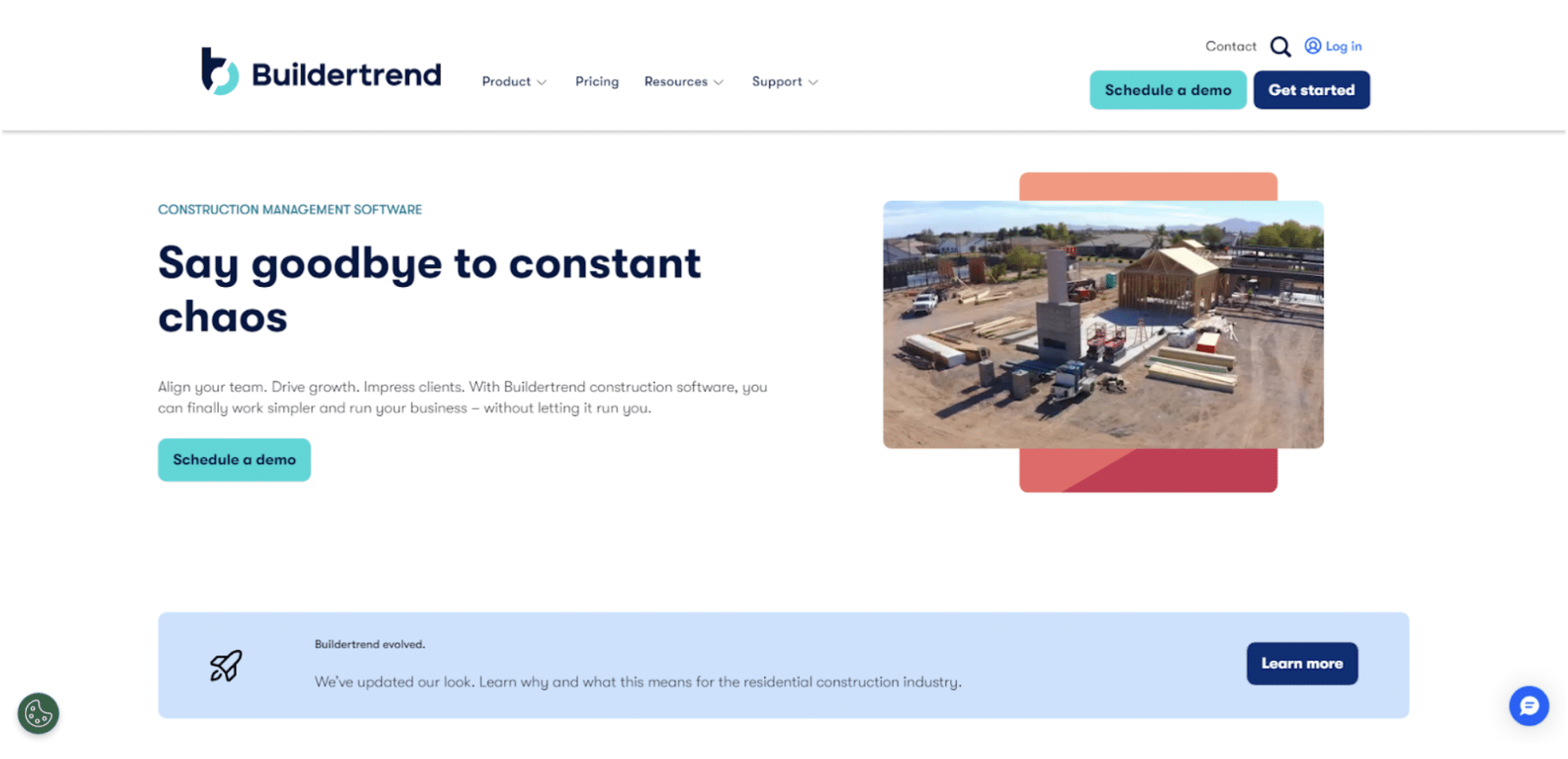
The next on our list of best CRM for construction companies is Buildertrend. Buildertrend’s suite of tools is designed for remodelers, contractors, and home builders. Their website approaches CRM from a client management standpoint. Buildertrend states that their software “helps you keep clients happy. More than 1 million users across 100 countries have chosen Buildertrend as their preferred platform for real-time collaboration throughout the building process.
Using Buildertrend, construction pros can coordinate with contractors, attract clients and keep them updated via a seamless dashboard.
Features
- Construction project and field management
- Project management
- Financial management
- Sales and marketing
- Integrations with select SaaS tools
- Invoice management
Pros and Cons
- Price points are affordable for solo, small, and medium-sized construction companies
- Special emphasis on project management
- Minimal features for sales and marketing functions (e.g., CRM)
- Technical challenges for their SaaS platform
- Fewer integrations than expected
Reviews
- 4.2/5 star rating on G2 (140 reviews total)
- 4.5/5 star rating on Capterra (1,604 reviews total)
- 6.8/10 score via TrustRadius (26 reviews total)
- 4.5/5 star rating via Software Advice (1,601 reviews total)
Pricing
- $399 per mo. (Essential)
- $699 per mo. (Advanced)
- $999 per mo. (Complete)
4. Leap: Best Construction CRM for Solo Contractors and Small Teams
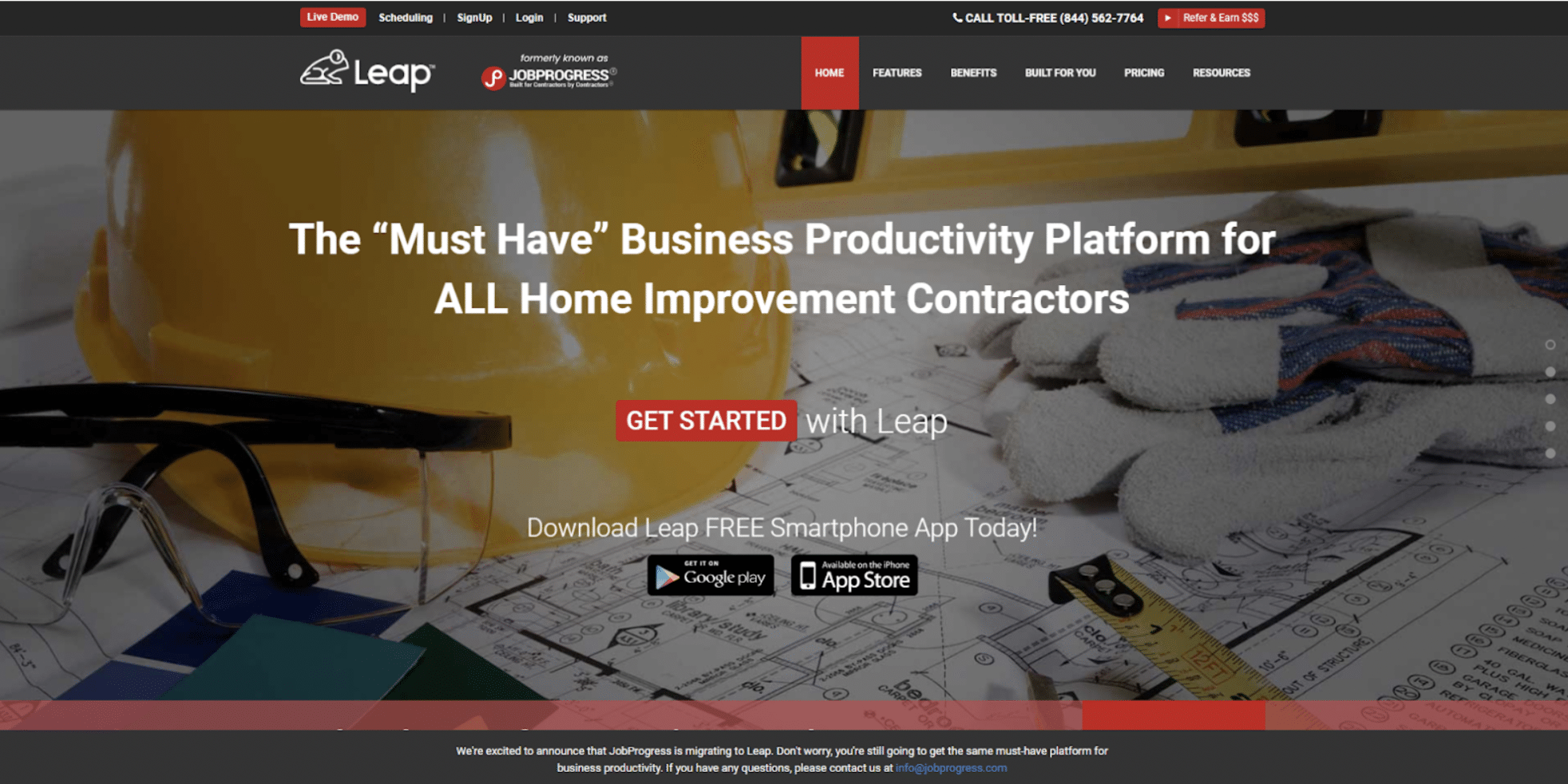
Leap describes itself as a “business productivity platform for contractors.” Leap is designed for various contractors, including general contracting, masonry, plumbing, roofing, and 25+ other specialties. Leap originally started off as a platform for roofers. Over time, they added a variety of specialties and services to attract more customers.
While Leap works for larger construction companies, it’s designed for small-to-medium contractors.
Features
- Fully featured field communications
- Insurance estimating
- Sales automation
- Construction project and field management
- Project management
Pros and Cons
- CRM software integrated with field and productivity tools
- Software can be time-consuming or difficult to use
- Software will take as much information (via customized fields) as users can add
- Insurance estimating
- Sales automation but unable to link marketing activity
- Third-party integration
- Higher user learning curve
Reviews
- 3.8/5 star rating on G2 (5 reviews total)
- 4.5/5 star rating on Capterra (1,604 reviews total)
- 6/10 score via TrustRadius (1 reviews total)
- 4.5/5 star rating via Software Advice (1,601 reviews total)
Pricing
- $79 per user/per mo.
- $500 setup fee
5. JobNimbus: Best Construction CRM for Roofing, Siding, and Gutter Specialists
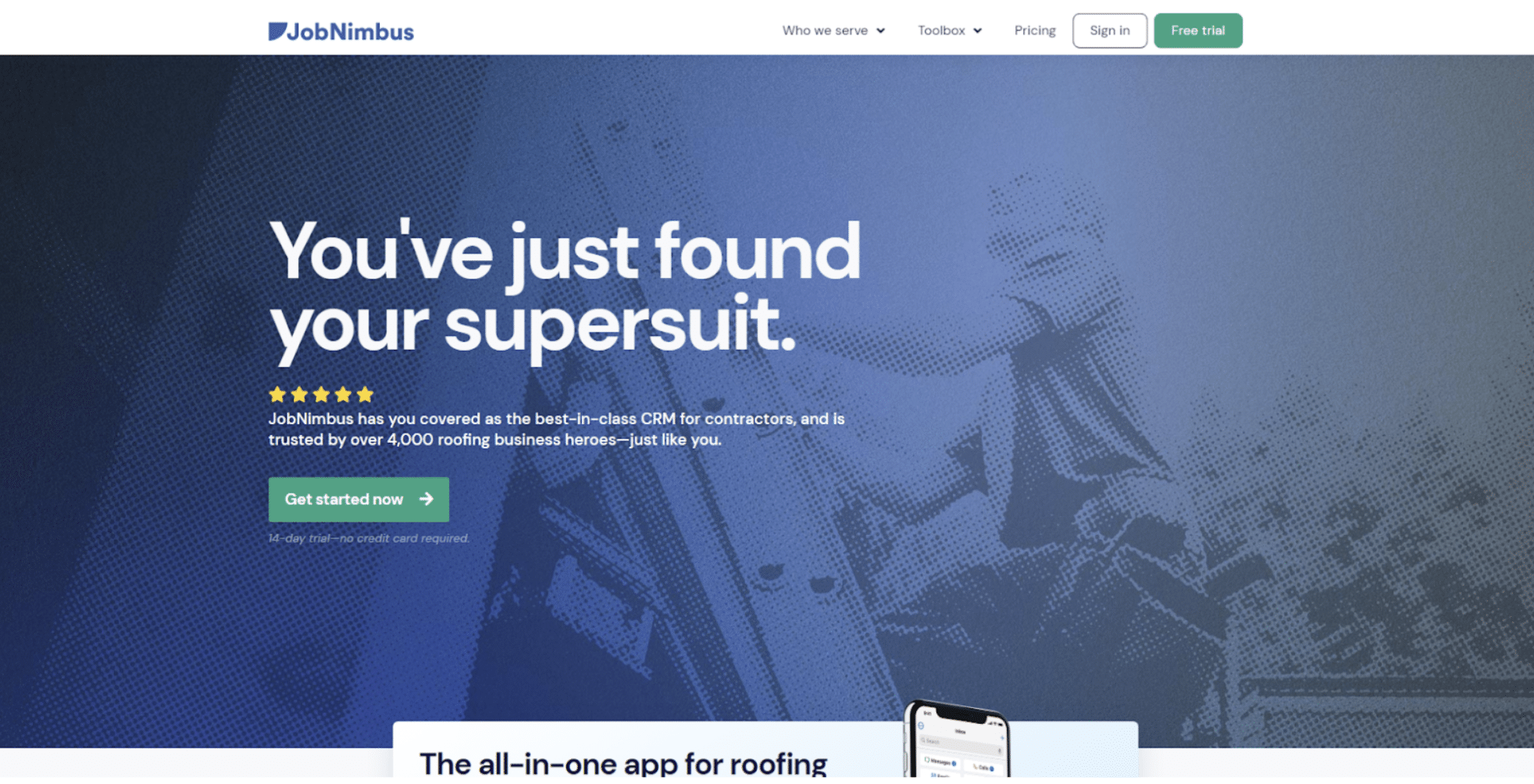
Here’s how the JobNimbus team describes their company.
“JobNimbus is a Utah-based CRM software company developed in 2013 with the help of leading industry trainers to give contractors a better tool for project management.” Did you catch that? JobNimbus includes CRM software, but the focus, as a whole, is project management.
JobNimbus is an all-in-one tool that’s designed to help contractors manage their projects successfully, producing on-time and in-budget delivery, increasing productivity over time.
Features
- Estimations and bids
- Scheduling
- Automation
- Billing and invoicing
- Project management
Pros and Cons
- JobNimbus has in-house payment processing for contractors
- Integrations and automations need more attention
- Users can’t track daily or monthly scheduling
- End-to-end project management software for contracting specialists (e.g., roofing, siding, etc.)
- Zapier integration and access to 16+ tools
- CRM integration works with the existing tools you already use (e.g., QuickBooks)
- Rapid expansion and growth means more errors and bugs
Reviews
- 4.6/5 star rating on G2 (60 reviews total)
- 4.6/5 star rating on Capterra (452 reviews total)
- 7.9/10 score via TrustRadius (1 reviews total)
- 4.5/5 star rating via Software Advice (452 reviews total)
Pricing
- Call for a quote
6. Buildern: Best Construction CRM with Project Management Feature
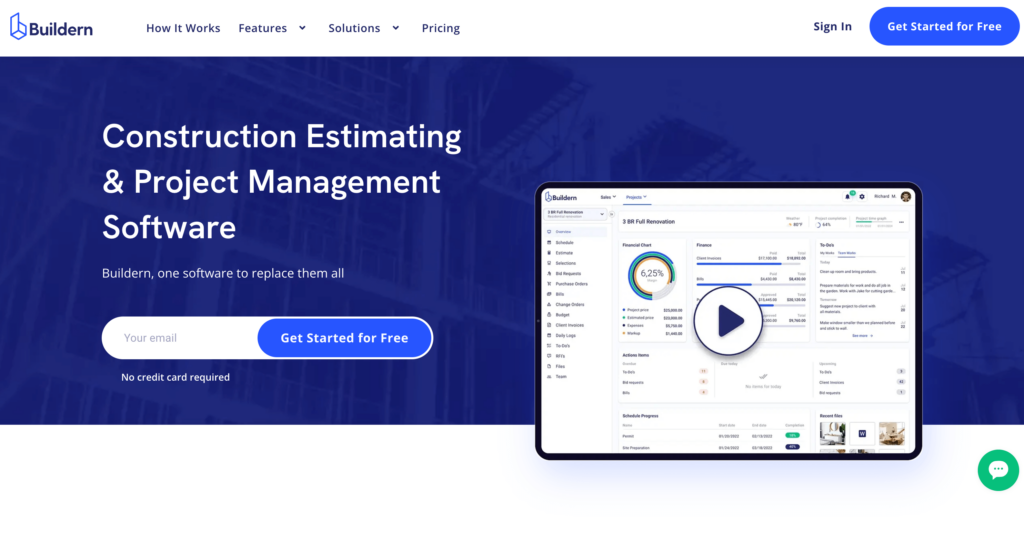
The next on our best construction CRM list is Buildern.
While some construction companies need powerful construction CRM software to manage leads and sales processes, others need help organizing their projects and teams. Buildern offers a construction CRM with a built-in project management solution.
With Buildern, you can see your people, where they are assigned to, and their tasks from a single tool. Leverage the multiple list views to monitor your teams and projects in detail or as an overview, create tasks and their subtasks to reduce clutter, and set reminders to ensure ensure timely completion of all tasks.
Features
- Accounting program and invoice generator
- Cost catalogs
- Timesheets to log your team’s working hours
- Mobile app to support your field workers
Pros and Cons
- All-in-one construction management app from pre-construction to project management and financial management
- AI scanner to quickly and accurately record subcontractor and vendor invoices
- A relatively new construction management tool, so many of its features are still being refined
- Limited mobile app functionality
Reviews
- 4.9/5 star rating on G2 (21 reviews total)
- 4.9/5 star rating on Capterra (21 reviews total)
- No review on TrustRadius
- 4.9/5 star rating via Software Advice (21 reviews total)
Pricing
Buildern offers two paid plans with a 7-day free trial option. Keep in mind that Buildern requires you to buy a minimum of two seats. An additional seat costs $90 per month.
- Starter: $250 per two users per month
- Professional: $400 per two users per month
- Enterprise: custom price
7. Followup CRM: Best Construction CRM with Bid Calendar Feature
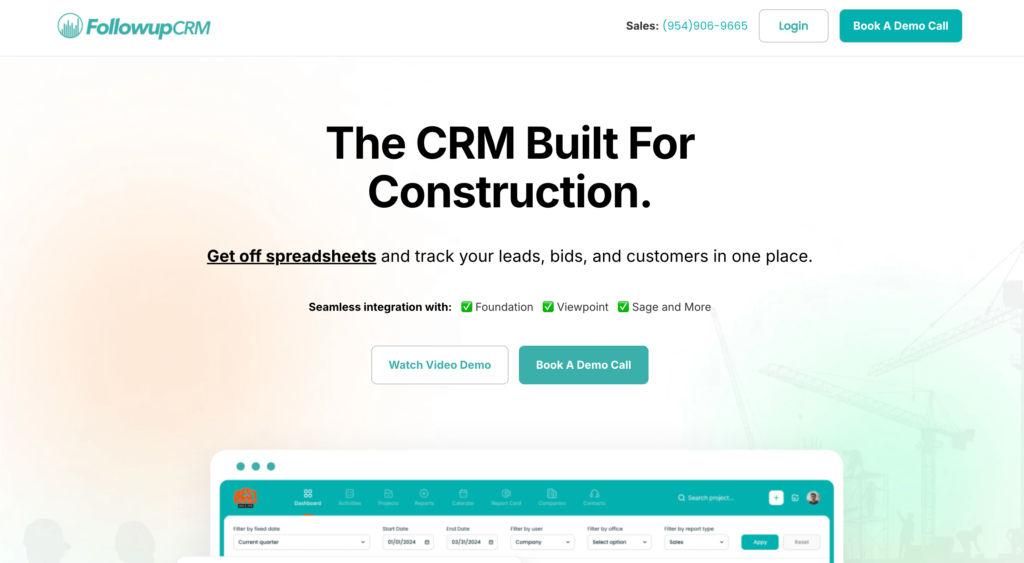
Many construction companies rely on winning construction bids to get new customers. It is then a no-brainer to put more effort into managing the bids.
Followup CRM comes up with a bid calendar and scheduling solution to help you streamline your bid management. With this construction software, you can effortlessly track the bid process, see the project detailed quotas and goals, and get reminded for any pending bids or projects.
Features
- Proposal generator to ensure each proposal meet the highest standards
- Follow-up reminders for open bids
- Historical data report to help decide which projects are worth bidding
Pros and Cons
- Various integration options, including Sage, Zapier, and Outlook
- Export leads automatically from Google Ads, Facebook, and emails
- Instant notifications for new updates on leads and team member activities
- Lack of features for field sales, i.e., poor experience and features on the mobile app, prospecting data, and map interface
- The user interface can be better
Reviews
- 4.5/5 star rating on G2 (56 reviews total)
- 4.5/5 star rating on Capterra (277 reviews total)
- 10/10 score via TrustRadius (18 reviews total)
- 4.5/5 star rating via Software Advice (277 reviews total)
Pricing
Followup CRM offers multiple paid plans. One of them is the Basic Option, which costs $4500 annually for 5 users. For higher plans or more users, contact the team.
8. Dataforma: Best Construction CRM with a Client Portal
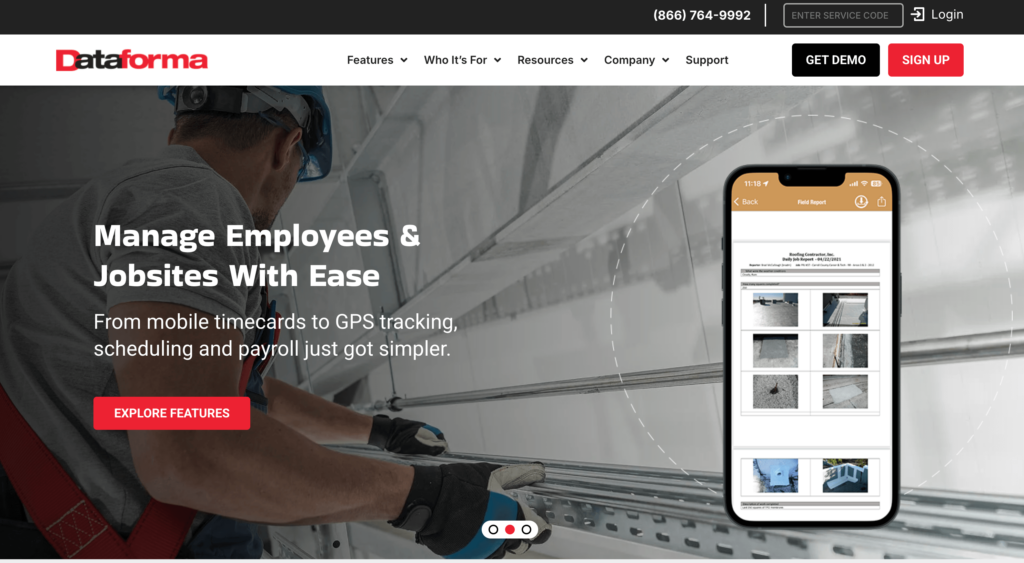
In construction, client communication happens frequently, especially during the construction phase. They often ask for project progress and photos, and you often remind them about outstanding invoices.
Dataforma‘s client portal streamlines this communication workflow. It provides a central location to upload project files and updates, empowering clients to independently access information. This reduces delayed responses and improves overall communication efficiency.
Features
- Integrated payment system to accelerate payments
- Email tracking and follow-ups
- Field time tracking and automated payroll processing
Pros and Cons
- Real-time updates on project status and progress
- Project and team management to avoid scheduling conflicts
- Steep learning curve, especially for users with no experience in using CRM or similar construction software
- Limited customization options
Reviews
- 3.9/5 star rating on G2 (6 reviews total)
- 4.3/5 star rating on Capterra (107 reviews total)
- No review on TrustRadius
- 4.3/5 star rating via Software Advice (107 reviews total)
Pricing
Dataforma doesn’t disclose its pricing. However, its Capterra page lists a $69.99 monthly subscription fee for its Basic plan.
9. Odoo: Best Construction CRM for Marketing-Focused Contractors
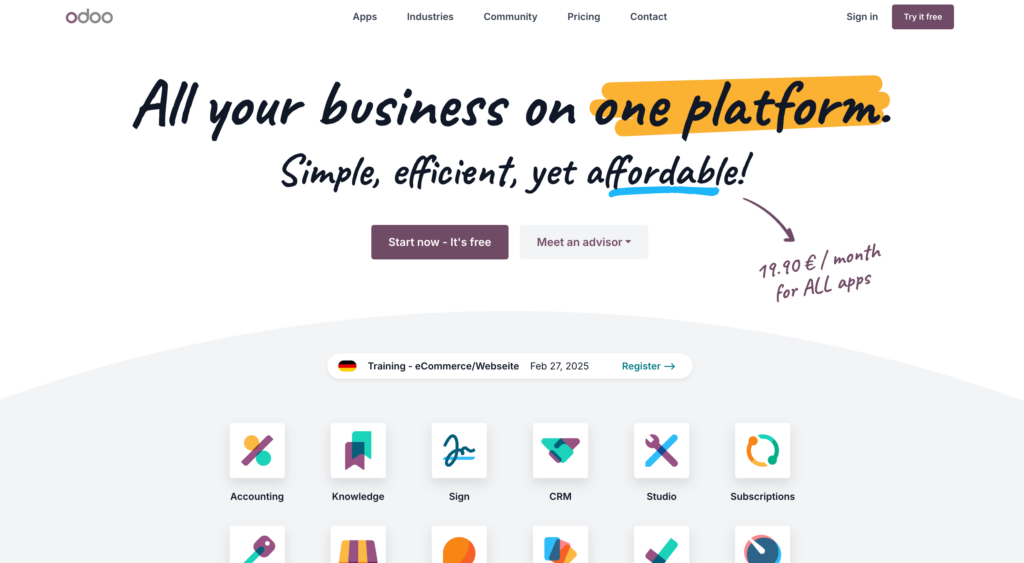
If marketing is an area your construction business wants to improve, Odoo might be an excellent solution. However, keep in mind that Odoo is an ERP tool with CRM capability.
Odoo offers several marketing functionalities, including email, SMS, and social media marketing. You can even schedule social posts directly from this construction CRM tool and monitor its performance in attracting new leads. If you prefer email marketing, Odoo provides a smart tracker that allows you to check your email’s open rate, CTR, and more.
Features
- Marketing automation
- Survey generator
- Simplified accounting solution
- Employee management
Pros and Cons
- A wide range of functionalities in one construction tool
- Modern and clean user interface
- Limited customization
- Steep learning curve
Reviews
- 4.3/5 star rating on G2 (293 reviews total)
- 4.2/5 star rating on Capterra (1220 reviews total)
- 7.0/10 score via TrustRadius (98 reviews total)
- 4.2/5 star rating via Software Advice (1220 reviews total)
Pricing
Odoo offers various plans based on the software functionality you want to adopt. If you plan to use one of its functionalities, such as CRM, you can register for its free plan. However, if you want to adopt more than one functionality, the paid plan starts from €19.90 per user per month for an annual subscription.
10. Workyard: Best Construction Management Software with GPS Tracking
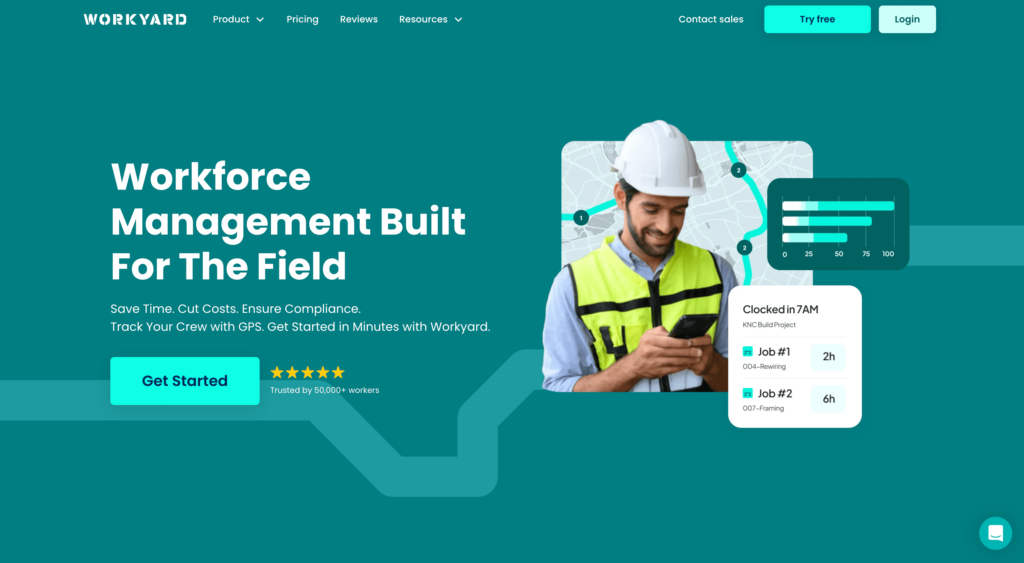
The last tool on our best construction CRM list is Workyard. Workyard isn’t a construction CRM per se. However, it offers some solutions that are suitable for construction companies looking to improve their day-to-day operations, especially in team and payroll management.
Many contractors struggle with accurately recording field employee work hours. For example, an employee might begin work at 7:10 but log their start time as 7:00. While this single instance might seem insignificant, the accumulated time discrepancies can result in substantial financial losses.
Workyard offers a GPS tracking solution for your workers. You know exactly when their work starts and ends, and how much millage your team spends, allowing you to process accurate payroll. And since the work hours are systematically logged, you can easily analyze your workforce, schedule incoming materials, and check the project timeline to ensure it meets the deadline.
Features
- GPS time clock
- Workforce scheduling
- Labor compliance
Pros and Cons
- 15+ native integrations to popular construction-related apps, including QuickBooks, ADP Run, and Foundation Software
- Integrated job costing and tracking
- Specialized for project-focused contractors and less support on the sales construction side
Reviews
- 2.5/5 star rating on G2 (2 reviews total)
- 4.8/5 star rating on Capterra (88 reviews total)
- No review on TrustRadius
- 4.8/5 star rating via Software Advice (88 reviews total)
Pricing
Workyard offers three paid plans with some add-on options, such as ERP integration, developer API, and custom file exports. Below are Workyard’s annual prices.
- Starter: $6 per user per month
- Pro: $13 per user per month
- Enterprise: custom price
What Are the Must-Have Features of a Reliable Construction CRM?
Not all construction-focused CRMs are created equal. Some excel at specific functionality, while others lack. That said, there are some essential features that you must check and try before committing to the CRM for the long term.
A. Customizable Data Fields and Sales Pipelines
Create a CRM system that works for you, not the other way around. A great construction CRM allows you to customize many aspects of the tool, such as changing the data type, setting data validation and formatting, creating new sales steps, and applying multiple sales pipelines for various sales workflows.
B. Solid Reporting, Analytics, and Forecasting
With many moving parts involved in a construction project, you’ll need to be able to keep track of them all. This includes your leads, team allocation, budget, and sales performance. Having a construction CRM that offers robust analytics and forecasting enables you to ensure you’re meeting the business goals and mitigating possible challenges ahead of time.
C. Automated Workflows and Email Communication
Save a lot of time from working on tedious tasks and spend more time scaling your construction business. Let the CRM work on auto-pilot to remind you of any unresponded emails, upcoming events, and outstanding invoices, and send follow-up emails.
D. User-Friendly Interface and Easy Onboarding
For construction workers who aren’t tech-savvy, learning a new CRM can be challenging. This is also one of the major reasons why CRM adoption for field workers is relatively low. So, before you decide to implement a new CRM for your construction company, ensure that the tool is super easy to use, has helpful guides for troubleshooting, and has reliable customer support to help you master the CRM.
Pipeline CRM Stands Out as the Best Construction CRM
If you’re looking for CRM software with strong sales features, look no further than Pipeline CRM. More than 18,000 users have used and loved our simple yet robust sales CRM software.
Take Rainier Custom Homes, for instance. Since adopting Pipeline CRM, they have improved time-to-close by more than 50%! Check out their success stories with Pipeline CRM.
Curious about what Pipeline CRM can do for your construction business? Try Pipeline CRM free for 14 days, and see the impacts!
Recommended Reading:
- The role of a CRM
- CRM Guides
- How to build a construction marketing plan
- How construction companies can forecast sales
FAQs on the Best CRM for Builders and Contractors
Answering some common questions about construction CRM and Pipeline CRM
.
1. How Can a Construction CRM Help Manage the Complex Sales Process in Construction, from Initial Contact to Contract Signing?
When you use a CRM, all stages of your sales process are well-documented and standardized in the system.
You can import construction leads generated from successful email marketing campaigns, nurture them automatically with email sequences, send reminders for proposals that haven’t been opened, and finally, record the signed contract once a deal is closed. Each step can be automated and easily reviewed, allowing you to identify and address any challenges that may arise.
2. Does a Construction CRM Offer Features for Managing Field Workers and Project Timelines?
A CRM is essentially made to help contractors and builders manage their sales process. This means that it isn’t necessary for a construction CRM to offer team and project management solutions. That said, some “CRMs” do provide these features.
3. Does Pipeline CRM Offer a Mobile CRM App?
Yes. Pipeline CRM has a mobile application that allows your field workers to access sales data even when they are on the go. Our mobile app also has built-in route mapping, talk-to-text recording, and a mobile business card scanner. Get the details of Pipeline’s mobile app CRM here.



